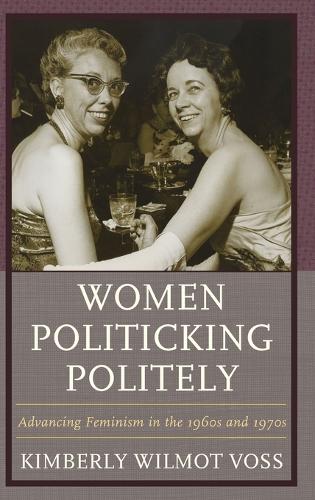
Women Politicking Politely: Advancing Feminism in the 1960s and 1970s
(Hardback)
Available Formats
Publishing Details
Women Politicking Politely: Advancing Feminism in the 1960s and 1970s
By (Author) Kimberly Wilmot Voss
Bloomsbury Publishing PLC
Lexington Books
5th April 2017
United States
Classifications
Professional and Scholarly
Non Fiction
Political science and theory
Central / national / federal government policies
Physical Properties
Hardback
170
Width 157mm, Height 239mm, Spine 17mm
390g
Description
This book includes the relatively unknown stories of six important women who laid the foundation for improving womens equality in the U.S. While they largely worked behind the scenes, they made a significant impact. In the group are two female political operatives who worked behind the scenes along with four female journalists who also occasionally worked within government to advance womens rights during the 1950s through the 1970s. Much of it centers on Washington, D.C., as well as the more unlikely cities of Madison, Wisconsin and Miami, Florida. It includes the story of a womens page journalist who published an official government report in her newspaper section when the White House refused to release it. This book documents the stories of women who organized to help gain employment for other women and also worked to raise the stature of homemakers. Numerous other issues for women were also addressed. The fight for equality became more visible in the 1960s although the foundation had been laid as early as the 1950s, fueled by the post-World War II era. Change was initiated by a mix of women in government and women in the news media at times going back and forth in those positions. These particular women were chosen because of their interactions with each other as they rallied around a common cause and because their names were overshadowed by other womens liberation leaders. It is not meant to be an exhaustive story of the fight for womens rights but rather an addition to the great memoirs and scholarship that already exist.
Reviews
Kimberly Wilmot Voss has taken up [Laurel Thatcher] Ulrichs challenge to look beyond the exceptional women of history (feminist iconoclasts like Betty Friedan) and delve into lesser-known sources to uncover the compelling stories of well-behaved women whose stories and contributions remain largely invisible. . . . Voss provides fascinating glimpses into the womens personal and professional lives, thanks to extensive research in the womens collected papers. * Missouri Historical Review *
It is important to know how history influences what we do today. Dr. Voss takes us back to the 1960s and 70s, the era of NOW, the ERA and womens liberation, when women were fighting for their rights, and tells the stories of six women who became change agents, particularly in the evolution of women and the media. She presents a wonderful picture of the times and captures the spirit of the women who changed how and by whom information important to women was disseminated. This was an important time in history, one of great social change and one this book brings to life. -- Lillian Lodge Kopenhaver, Florida International University
In Women Politicking Politely, Dr. Voss not only recovers the lives of six important American women but also illuminates the complicated dynamics of social movements. Historians tend to give outsized attention to outspoken protesters, while overlooking those equally important advocates who do the vital work of documenting, publicizing, fund-raising, and pressuring politicians directly. Vosss exploration of these understudied well behaved womenfour journalists and two government operativeswho moved feminism forward rebalances the history of the 1960s and 1970s. Women Politicking Politely is an important contribution to our understanding of the American feminist movement, social movements in general, and the nature of historical memory. -- Heather Cox Richardson, Boston College
Author Bio
Kimberly Wilmot Voss is professor of journalism at the University of Central Florida in Orlando.
